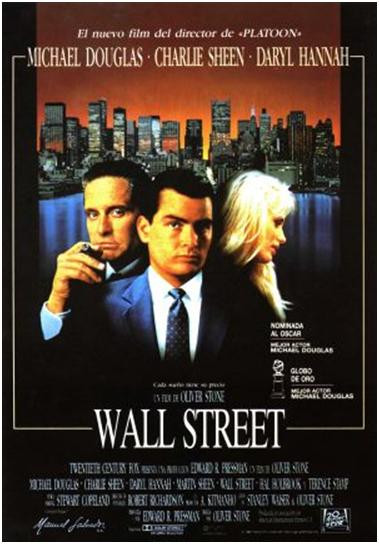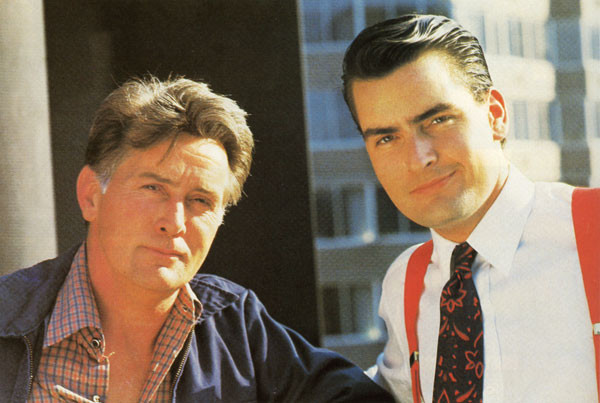Oliver Stone’s 1987 cinematic masterpiece, Wall Street, remains a definitive portrayal of the decade’s excessive financial culture and the seductive allure of wealth. Even decades later, and in anticipation of Stone’s sequel, “Wall Street: Money Never Sleeps,” it’s essential to revisit and deeply appreciate the original film’s sharp commentary and compelling drama. This isn’t just a movie; it’s a cultural touchstone that captured the zeitgeist of an era defined by ambition and unchecked capitalism, cementing its place as a cornerstone of cinematic history and arguably Stone’s finest work.

The film plunges us into the high-stakes world of 1980s Wall Street through the eyes of Bud Fox, played with hungry ambition by Charlie Sheen. Fox, a junior stockbroker, yearns for a seat at the table with the financial titans. His relentless pursuit leads him to Gordon Gekko, embodied with iconic ruthlessness by Michael Douglas. Gekko, a corporate raider and the film’s central figure, is the personification of 1980s greed, operating from an office that feels less like a workplace and more like a command center.
Bud’s initial attempts to gain Gekko’s attention are met with cold indifference. In a memorable scene set within Gekko’s chaotic office – a space filled with frantic activity and the haze of cigarette smoke – Fox pitches idea after idea, only to be dismissed. Gekko, unimpressed, labels Fox’s suggestions as “dogs with fleas.” It’s only when Fox, in desperation, mentions “Blue Star,” an airline connected to his father, revealing inside information about an impending government ruling, that Gekko’s interest is piqued. This access to insider knowledge is Fox’s ticket in, leading Gekko to take him under his wing, initiating Bud’s descent into a morally ambiguous world.
At its heart, Oliver Stone’s Wall Street explores a powerful father-son dynamic, adding layers of emotional depth to the financial drama. Bud Fox is torn between two starkly contrasting paternal figures: his hardworking, blue-collar father, Carl Fox (played by Martin Sheen, Charlie’s real-life father), and the slick, morally flexible Gordon Gekko. This dichotomy is powerfully illustrated when Bud visits his father in the hospital after a heart attack. In this poignant scene, Bud confronts the consequences of his choices and the values he has compromised in his pursuit of wealth, creating one of the film’s most emotionally resonant moments.

The film’s pacing is masterfully handled, maintaining a brisk momentum that keeps the audience engaged from beginning to end. While Wall Street delves into the complex world of stock trading, bonds, and corporate finance, it avoids condescension. The financial jargon, though dense at times, is navigated through compelling performances and a narrative that prioritizes human drama. We are drawn into Bud’s world, understanding his motivations and the ethical dilemmas he faces, even if the intricacies of insider trading are not fully grasped by every viewer.
The performances in Oliver Stone’s Wall Street are truly exceptional. Michael Douglas’s portrayal of Gordon Gekko earned him an Academy Award for Best Actor, a testament to his captivating and chilling performance. Charlie Sheen matches Douglas’ intensity, delivering a career-defining performance as Bud Fox. The supporting cast, including Martin Sheen, Terrence Stamp, John C. McGinley, and Hal Holbrook, further elevates the film with their strong portrayals, creating a rich tapestry of characters inhabiting this cutthroat world.
Oliver Stone’s directorial style is crucial to the film’s success. He possesses a unique ability to make his films feel intensely relevant and real, capturing the pulse of the era he depicts. The iconic park bench scene between Gekko and Fox, for example, is a masterclass in cinematic storytelling, perfectly encapsulating the materialism, energy, and underlying themes of the 1980s. Stone doesn’t just direct a movie; he creates an immersive experience, allowing the audience to feel the seductive pull of Wall Street and the moral compromises it demands.
Oliver Stone’s Wall Street is more than just a period piece; it’s a prescient commentary on the dangers of unchecked greed, a theme that sadly remains relevant today. The film’s enduring legacy is undeniable, influencing not only cinema but also our understanding of financial ethics. The anticipation surrounding “Wall Street: Money Never Sleeps” speaks volumes about the original film’s impact and its continued resonance in a world still grappling with the consequences of financial excess. “Wall Street” isn’t just a great film; it’s a cinematic landmark, a 10/10 masterpiece that deserves its place at the top of Oliver Stone’s filmography and in the annals of movie history.

